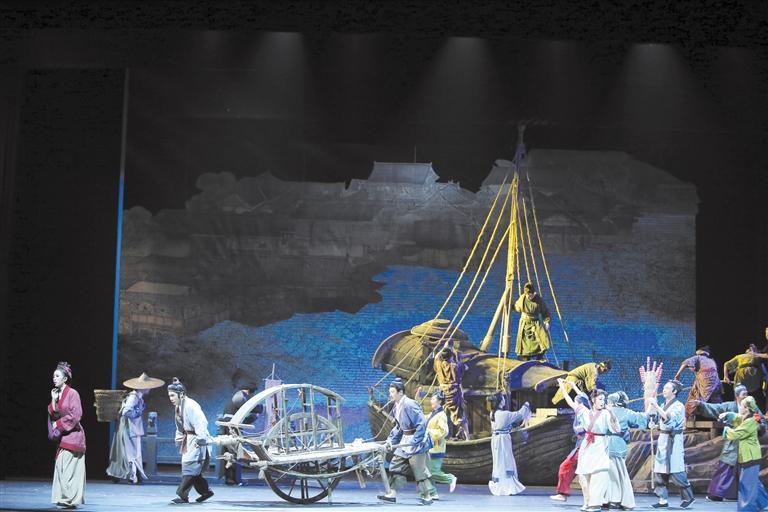"Tiefan Royal History" Reproduces the Elegance of the Year "Tianfu Culture" and Deduces the Samples of Qingbaijiang River
发布日期:2018-07-18 来源: Chengdu Daily
Throughout the millennium, Zhao Xue, the "iron-faced imperial history", reappeared his elegant demeanor at that time; looking forward to the future, Tianfu cultural brand vividly deduced the Qingbai River sample.
Last night, Zhao Zao, a drama created by Qingbaijiang District and reflecting the life story of Zhao Zao, the imperial historian of the Northern Song Dynasty, was premiered at the Jincheng Art Palace in Chengdu, showing the image of a statesman who runs the country, punishes corruption, promotes talents and benefits the people, as well as the depth of Qingbaijiang District. Explore the vivid practice of "Tianfu Culture".

Make efforts to create
The Millennium Story of Iron-Faced Royal History Comes on the Stage of Chengdu
"A historical play, let me re-recognize Zhao Xie at the same time, the future work has some new thinking." After watching the play, a party member and cadre of Chengdu Environmental Protection Bureau expressed their feelings in the circle of friends.
The simple record of Zhao Xie in the history books is as follows. During his official period, he went to Shu four times and served as the prefecture of Chengdu twice. From the Northern Song Dynasty to the first year of Hehe (1054), Zhao Xie went to Beijing to serve as the Imperial Palace in the history of imperial palace. He presented nearly 200 pieces to the emperor, including many themes, such as governing the country and the state, punishing corruption, recommending talents and calling for the people, which played a very important role in the great political policy, appointing officials, resisting foreign aggression and stabilizing the territory of the Northern Song Dynasty. Use. For more than forty years, Zhao Tiao has been known as the "iron-faced imperial history" for his honesty, corruption and diligence. Song Yingzong appraised him as a "neutral government". Su Xun, Su Shi, Su Zhi's father and son, Ouyang Xiu, Jia Hu and other talented people of the Song Dynasty, have been strongly recommended by Zhao Zao, to obtain the opportunity to display their talents.
It is understood that in order to better show Zhao Zao, a historical figure, Qingbaijiang District, in combination with the specific requirements of the "Tianfu Culture" of the new era, has gathered excellent professional theatre creators from Sichuan Province and the whole country in the process of drama design and rehearsal. Liu Yueqi and Kong Fei, excellent performers of the Sichuan People's Art Theatre, respectively, play in the play. Zhao Xie and Song Renzong, art director of Sichuan People's Art Theater and national first-class actor Jia Jianjian, play Chen Zhizhong. There are more than 30 performers in the play, which not only gathers many excellent young actors in Sichuan Province, but also invites many "old opera bones". Liu Yunyuan, Wang Yuejin and Cao Lichun, the first-class performers of the Sichuan People's Art Theater, play different officials of the Great Song Dynasty in the play, and have been following Zhao Xie's old rules. Xu Guangju, a famous performer of Quyi Troupe of Chengdu Academy of Non-material Cultural Heritage Art, plays the role.
While giving full attention to the characterization of the characters, the performances also have almost strict requirements on the form of expression. The whole stage uses three perspectives in the architecture of the Song Dynasty. Whether in Bianjing or Chengdu, it shows the prosperity and simplicity of the Song Dynasty. Lighting design and fashion design have invited the famous "big cafe" in China to operate knives in person. During the period of creation, the creative team also went to Qingbai River three times to collect the style. Through thousands of years, they felt Zhao Zao's real life and official scenes, and depicted the characters more deeply.
Mining and inheriting
The Practice of Writing "Tianfu Culture" Brand in Qingbaijiang
Culture is the soul of a city. The 13th Party Congress of Chengdu put forward that in order to inherit the civilization of Bashu and develop Tianfu culture, Chengdu needs to create a unique urban cultural image, enhance the appeal and persuasion of cultural exchanges, and finally build a world culture with distinct regional characteristics and multi-cultural integration and development.
